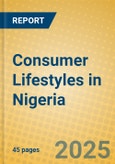The Consumer Lifestyles in Nigeria report analyses factors influencing national consumer expenditure. Consumer lifestyles reports include coverage of: population, urban development, home ownership, household profiles, labour, income, consumer and family expenditure, health, education, eating habits, drinking habits, shopping habits, personal grooming, clothing, leisure habits, savings and investments, media, communication, transport and travel and tourism. Use this report to understand the factors influencing a nation's lifestyle choices.
Data coverage: market sizes (historic and forecasts), company shares, brand shares and distribution data.
Why buy this report?
- Get a detailed picture of the Consumer Overview market;
- Pinpoint growth sectors and identify factors driving change;
- Understand the competitive environment, the market’s major players and leading brands;
- Use five-year forecasts to assess how the market is predicted to develop.
Table of Contents
- Scope
- Consumer landscape in Nigeria 2025
- Personal traits and values
- Nigerians feel concerned that the cost of everyday items are going up
- Nigerians say that their identity is acknowledged and embraced by the broader society
- Consumers in Nigeria like to try new products and services
- Millennials are looking forward to a brighter future
- Personal traits and values survey highlights
- Home life and leisure time
- Cleaning and domestic chores - a leading home activity among all generations
- Younger generations access social media accounts to edit profiles
- Home life and leisure time survey highlights
- Eating and dietary habits
- Millennials are actively tracking their calorie intake
- Baby Boomers more likely to be diabetic
- Consumers are ready to pay more for products with health and nutritional properties
- Eating and dietary habits survey highlights
- Working life
- Nigerians would like to start their own company
- Working life survey highlights
- Health and wellness
- Health and nutritional properties is the most influential product feature
- Millennials use apps to track health or fitness
- Health and wellness survey highlights
- Shopping and spending
- Nigerians attempt to adopt a minimalist way of living
- Gen X prefer purchasing a smaller quantity of items, but of superior quality
- Gen Z pick their travel destinations based on the quality of shopping there
- Older generations try to purchase locally-sourced products and services
- Nigerians often share/swap items or services
- Millennials regularly write reviews for a products or services
- Consumers primarily trust friends and family recommendations
- Consumers expect to increase spending on education the most
- Older generations are content with the situation of their finances
- Shopping and spending survey highlights








